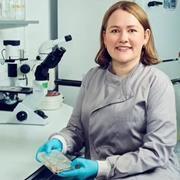Abstract
Reduction of amyloid beta (Aβ) has been shown to be effective in treating Alzheimer's disease (AD), but the underlying assumption that neurons are the main source of pathogenic Aβ is untested. Here, we challenge this prevailing belief by demonstrating that oligodendrocytes are an important source of Aβ in the human brain and play a key role in promoting abnormal neuronal hyperactivity in an AD knock-in mouse model. We show that selectively suppressing oligodendrocyte Aβ production improves AD brain pathology and restores neuronal function in the mouse model in vivo. Our findings suggest that targeting oligodendrocyte Aβ production could be a promising therapeutic strategy for treating AD.
PMID:39042667 | DOI:10.1371/journal.pbio.3002727
UK DRI Authors



